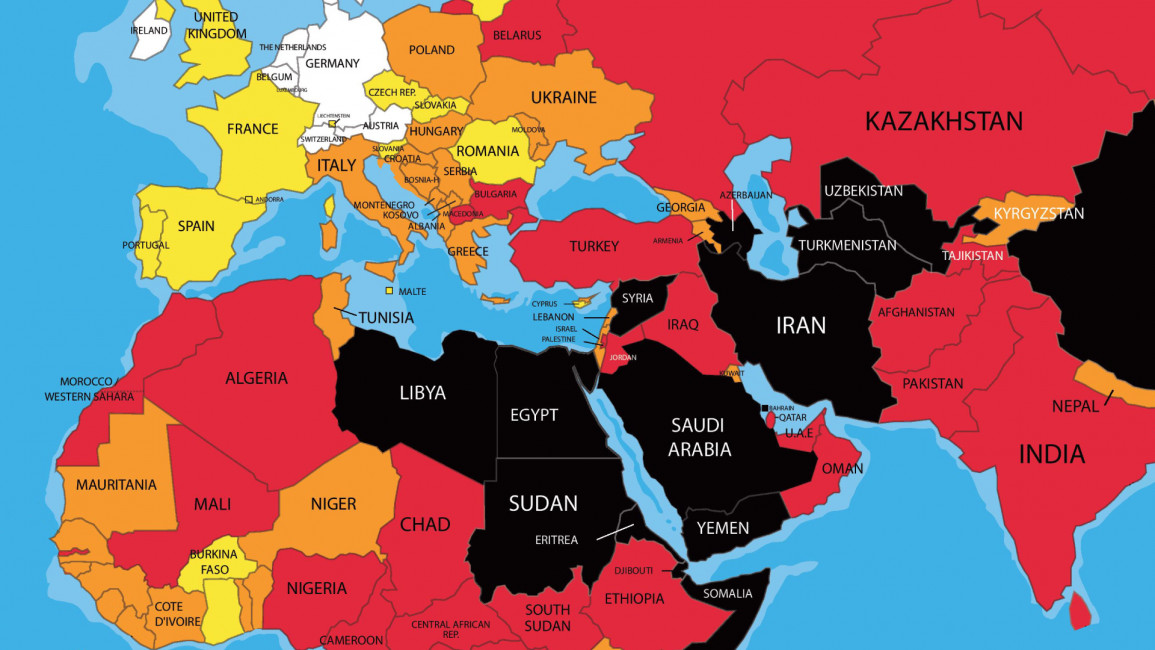
Authoritarianism: The nemesis of press freedom
Not surprisingly, the Paris-based Reporters Without Borders (RSF) 2017 World Press Freedom Index ranked eight Arab countries as having a "bad" record regarding freedom of the press during past year. It also ranked nine other countries in the region as "very bad" for press freedom, four countries as "problematic" and only one country (Comoros) as "fairly good".
Egypt, for instance, ranked 161st on the index which examines state of press freedoms every year in 180 countries. In the 2016 index, Egypt ranked 159th, and 158th in 2015. The RSF annual review is based on an "an evaluation of pluralism, independence of the media, quality of legislative framework and safety of journalists".
Not a single Arab country has ranked "good" on the index, and although these reviews and indexes are perhaps concerned with portraying an overall view of the situation in any given country regarding freedom of the press; they provide methodological and systemic view of each state or country.
However, measuring the state of freedom of press, can't be separated from the study of overall freedoms, liberties and respect for human rights in any country. One important review released in late January this year by US-based Freedom House which publishes the Index on Freedom in the World 2017.
This index assesses "the condition of political rights and civil liberties around the world". A glance at the MENA's frontpage map summarizes the state of affairs: Only four countries across the region are labelled yellow (partly free) while only Tunisia is ranked as free among the 22 Arab countries ranked part of the review. The rest is not free.
 |
The term 'authoritarianism' is never ambiguous it connotes control, restrictions, subjectivity, bans, censorship in most cases and most importantly, risks |  |
Evidence has been mounting over the last few years that authoritarianism is sweeping over the majority of Arab countries. For the media, the term "authoritarianism" is never ambiguous it connotes control, restrictions, subjectivity, bans, censorship in most cases and most importantly risks.
Examples of "disabling" factors for a free press can be seen in each Arab country (whether in 2017 or earlier). They include arbitrary arrests of journalists, editors, bloggers and social media activists and commentators.
In Egypt, for instance, the New York-based Committee to Protect Journalists (CPJ) 2016 Prison Census lists 25 journalists in jail; some were charged and others were not, like Mahmoud Abou Zeid (known as Shawkan), a freelance photojournalist detained in summer 2013 while covering the dispersal of protesters in August and the ensuing Rabaa massacre.
| Read more: Syria's citizen journalists on the frontline of press freedom | |
Shawkan was kept in detention without charge until September 2015 when Cairo criminal court charged him with "weapons possession, illegal assembly, murder, and attempted murder". It's worth noting here that the CPJ's narrow definition of who can be identified as working journalist may have led to fewer numbers of "Egyptian journalists in jails", and local groups estimate much higher numbers (for instance, the Arabic Network for Human Rights Information lists 63 journalists in jail).
In Bahrain, RSF notes that the government there is "notorious for jailing large numbers of journalists, especially photographers and cameramen". On the RSF index, Bahrain fell two places, and ranked this year at 164.
 |
Independent activists use alternative means to express opinions and share information with the public |  |
In April this year, 16 national, regional and international groups wrote to the King of Bahrain expressing concern with the government's "continued targeting of journalists" while noting the case of photo journalist Sayed Ahmed Salman al-Mousawi, who faces terrorism related charges after more than three years of detention.
One may wonder, however, since there is no independent media in a country such as Saudi Arabia, what kind of violations and abuses against the media take place?
The answer is - as in any other country where political space is completely closed, and the practice of journalism is considered a government function - independent activists use alternative means to express opinions and share information with the public.
 |
Jordan's government has ordered 14 gag orders since 2014 |  |
Social media has provided a platform for Saudi activists to do so. But instead of debating with these activists peacefully, meeting them on the same platforms; the Saudi government jails them, persecutes and prosecutes them relentlessly.
Authoritarianism is characterised by strict controls on what the public should (or shouldn't) know. Jordan's practice over the past few years in ordering gags over certain topics and issues makes it not only an obstacle to freedom of information, but actual censorship without legal justification.
Jordan's government has ordered 14 gag orders since 2014 on stories such as "Complaint by orphans against the Social Development Ministry; A street assault on an Egyptian worker in Jordan; A security operation in the northern town of Irbid in March; An attack on a General Intelligence Directorate office north of Amman; and others.
While Tunisia has taken a step backwards on the RSF index, it remains out of the danger zone. The country is also labelled "Free" on the Freedom House index and the truth behind this rests in its resilient civil society movement of groups, NGOs, academics, activists and trade unions.
Tunisia is the one exception to the rule and a model in the Arab world. Civil society played (and is still playing) a critical role to maintaining a reasonably open political space where the rule of law provides a strong framework to guarantee basic rights and liberties; enabling at the same time civil society organisations and trade unions to defend those rights peacefully and sustainably- unlike almost all other Arab countries.
Fadi Al-Qadi is Amman-based Middle East and North Africa human rights, civil society and media commentator. Twitter: @fqadi
Opinions expressed in this article remain those of the author and do not necessarily represent those of The New Arab, its editorial board or staff.




